In British slang, you'll find 'plank' intriguingly shifted from its original French roots as a flat timber piece to a playful jab at intelligence. This transformation underscores language's dynamic nature, adapting across centuries to convey humor and critique lightly. The term's evolution, from a mere object to an expression of lighthearted insult, marks an important cultural pivot, shedding light on how communities redefine words to reflect shared attitudes and humor. Beyond mere mockery, understanding 'plank' offers insights into the nuances of British colloquialisms and the historical layers enriching contemporary usage. Exploring further reveals the rich tapestry of language evolution and cultural significance, inviting a deeper comprehension.
Key Takeaways
- 'Plank' in British slang is used to humorously mock someone's intelligence, implying they are not very smart.
- The term originates from Old French 'planke,' meaning a flat piece of timber, reflecting its evolution in usage.
- It is often employed in a light-hearted or teasing manner rather than with harsh criticism.
- The evolution from a physical object to a playful insult showcases the playful nature of language transformation.
- Understanding its usage can help non-native speakers grasp British colloquial humor and cultural nuances.
Origins of 'Plank'
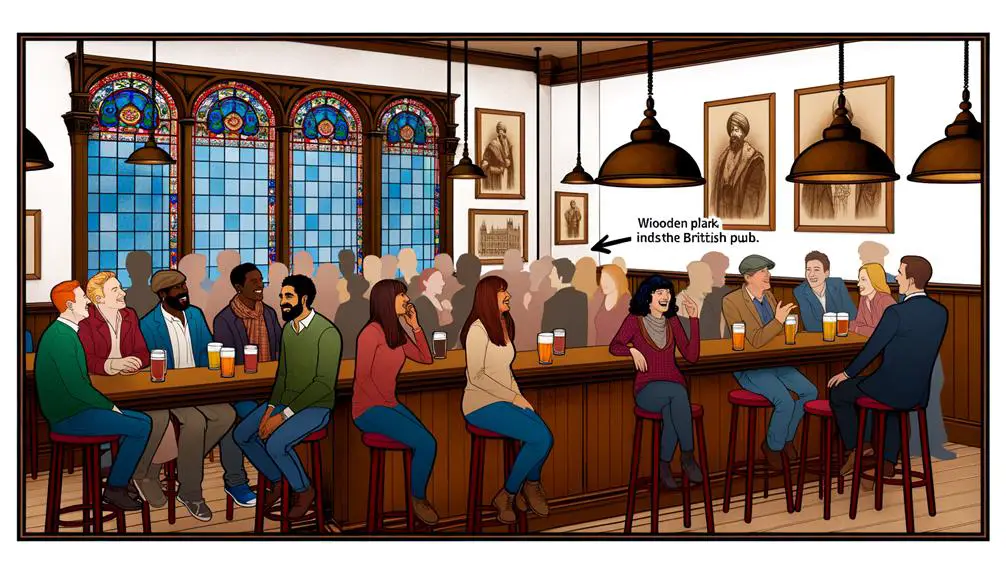
What're the roots of the term 'plank' in British slang, and how has it evolved into its current usage? Delving into the etymological roots and the domain of historical linguistics provides an insight into this transformation. Originally, 'plank' derives from the Old French 'planke' or 'planc', referring to a flat piece of timber. This straightforward physical description, however, began to take on a metaphorical dimension over time.
In examining the evolution of 'plank' within British slang, it's important to understand the socio-linguistic shifts that influenced this change. The term began to embody characteristics associated with its physical properties—flat, rigid, and perhaps lacking in depth or complexity. As a result, 'plank' morphed into a slang term used to describe someone perceived as dull, intellectually unresponsive, or lacking emotional depth. This adaptation showcases the linguistic phenomenon where concrete nouns acquire abstract meanings based on perceived attributes.
The journey of 'plank' from a literal object to a metaphorical descriptor in British slang epitomizes the fluid nature of language. Each step in its evolution—from Old French to Middle English, and finally into the domain of slang—reflects broader historical and cultural dynamics. Linguists studying the phenomenon of slang development often emphasize the role of societal attitudes and the human tendency to use familiar physical objects to describe abstract human qualities.
Standard Usage in Dialogue
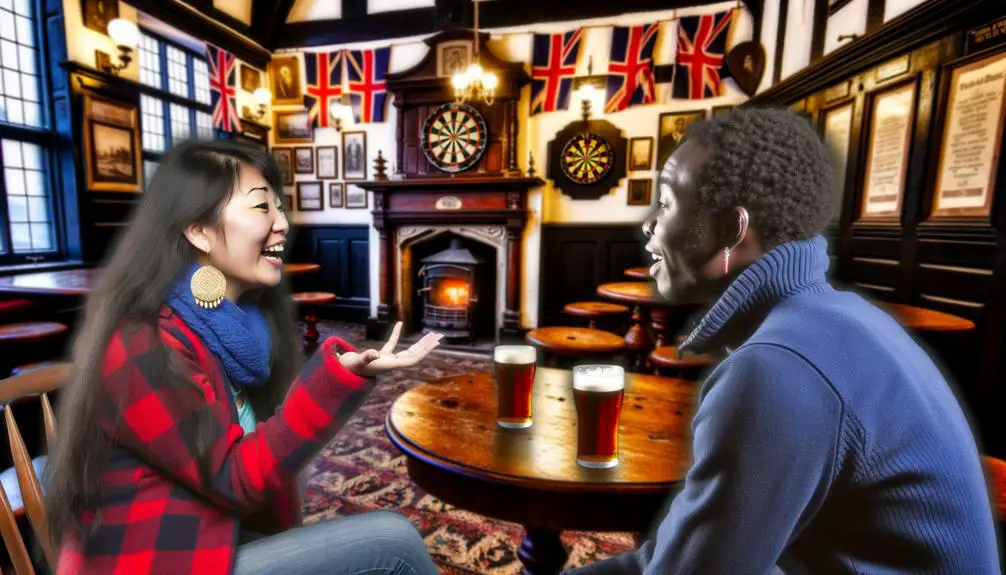
You must now turn your attention to how 'plank' functions within everyday dialogue, focusing specifically on common expressions and the importance of contextual interpretation.
By dissecting its standard usage, you'll uncover nuanced meanings that hinge on the speaker's intent and the situational context.
This analysis will empower you to grasp the slang's flexibility and its potential to convey a range of sentiments, from playful banter to pointed criticism.
Common Expressions Explained
In analyzing British slang, the term 'plank' often surfaces in dialogues, encapsulating nuances that transcend its literal meaning. This expression, indicative of someone's foolishness or lack of intelligence, reflects the dynamic nature of slang evolution and its profound cultural impact.
By examining its standard usage in dialogue, one appreciates its function not merely as a derogatory term but as a linguistic tool that fosters camaraderie or humor among speakers. Its application varies widely, yet it consistently conveys a clear, albeit informal, assessment of someone's actions or decisions.
Understanding 'plank' within this framework requires recognizing its role in facilitating social bonds and expressing shared values or criticisms, thereby illustrating the intricate relationship between language, identity, and culture in the field of British slang.
Contextual Interpretation Tips
To accurately grasp the nuanced usage of 'plank' in British slang, it's essential to explore specific dialogical contexts where the term typically surfaces, emphasizing its role in conveying disdain or amusement towards someone's perceived foolishness.
Understanding this slang within conversations requires a keen awareness of the slang evolution and cultural nuances that shape its application.
When someone is labeled a 'plank,' it's not merely a superficial insult. It's steeped in a tradition of playful yet pointed critique, reflecting the speaker's perception of the target's lack of insight or common sense.
This usage, deeply embedded in British cultural discourse, offers a fascinating lens through which to examine how language evolves and adapts, enriching our appreciation for the dynamic relationship between words and their meanings within specific socio-cultural contexts.
'Plank' in Pop Culture
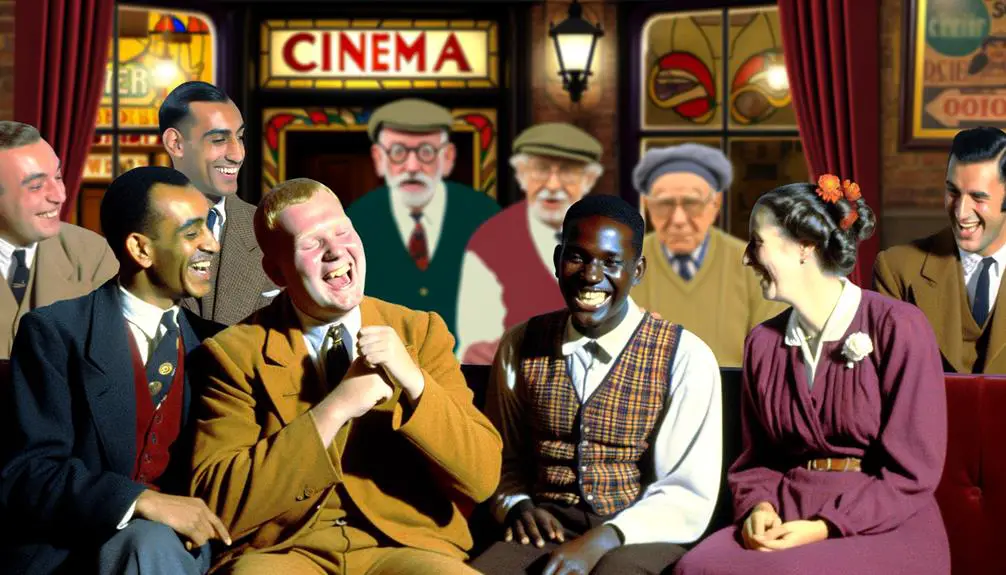
Plank's presence in pop culture often signifies a character's simplicity or foolishness, reflecting its British slang connotation with remarkable consistency across various media platforms. This portrayal taps into the broader cultural understanding of the term, leveraging its derogatory essence to craft characters or situations that embody the quintessential 'plank' behavior. Through careful examination, you'll notice that plank memes and celebrity planks serve as pivotal elements in disseminating this cultural symbol, embedding it deeply within the collective consciousness of a global audience.
Plank memes, for instance, cleverly juxtapose the literal and figurative meanings of the word, often depicting individuals in situations that highlight their lack of awareness or intellect. These digital artifacts, circulating widely across social media platforms, reinforce the term's slang connotation by showcasing real or fictional scenarios where the metaphorical 'plank' comes to life. The humor and critique embedded in these memes contribute substantially to the term's endurance and versatility in digital culture.
Celebrity planks, on the other hand, provide a fascinating glimpse into how public figures navigate the cultural landscape shaped by this slang. When celebrities are dubbed as 'planks,' either in jest or critique, it underscores the term's fluidity and adaptability. These instances not only entertain but also offer a critique of celebrity culture, highlighting moments of perceived simplicity or foolishness in a way that resonates with the public's understanding of the slang.
In essence, plank's integration into pop culture through memes and celebrity references serves as a proof of its enduring relevance and adaptability. This cultural phenomenon, while rooted in British slang, has transcended geographical and linguistic boundaries to become a versatile symbol of simplicity and foolishness in the global vernacular.
Variations Across the UK
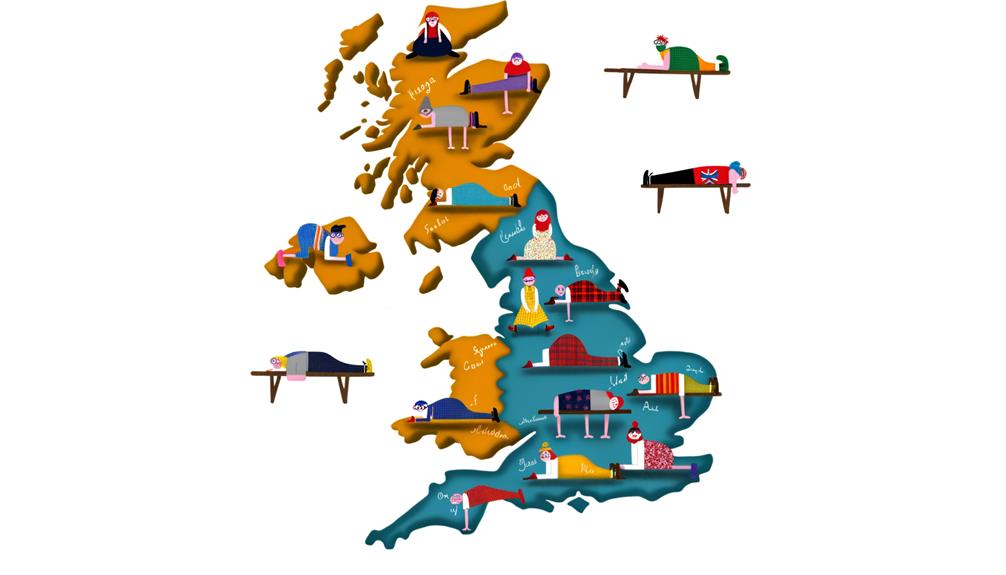
While exploring the widespread influence of 'plank' in pop culture, it's equally important to examine how its meaning and usage differ throughout various regions of the UK. Your understanding of this term will greatly deepen when you consider the rich tapestry of regional dialects and cultural influences that shape the way 'plank' is perceived and utilized across the country.
In some areas, particularly those with strong, localized identities, 'plank' transcends its general connotation of referring to someone as foolish or lacking in intelligence. These regional variations aren't merely linguistic anomalies but are reflective of the broader socio-cultural dynamics at play within different UK communities. For instance, in parts of Northern England, 'plank' might carry a more affectionate undertone, used among friends in a teasing but endearing manner. This subtle shift in usage underscores the importance of context and familiarity with local linguistic norms.
Conversely, in certain Southern regions, the term can be perceived as harsher, potentially signaling a more serious critique of one's actions or behavior. This dichotomy between the North and South exemplifies the influence of regional dialects on the interpretation of slang, highlighting how cultural nuances greatly impact language.
Moreover, the presence of cultural influences, such as local media and literature, further molds the application and reception of 'plank' across the UK. These mediums often reflect and amplify regional identities, reinforcing specific uses of the term that align with local attitudes and values.
Understanding these regional distinctions is essential for anyone looking to grasp the full spectrum of 'plank's' meaning within the UK's diverse linguistic landscape.
Common Misunderstandings
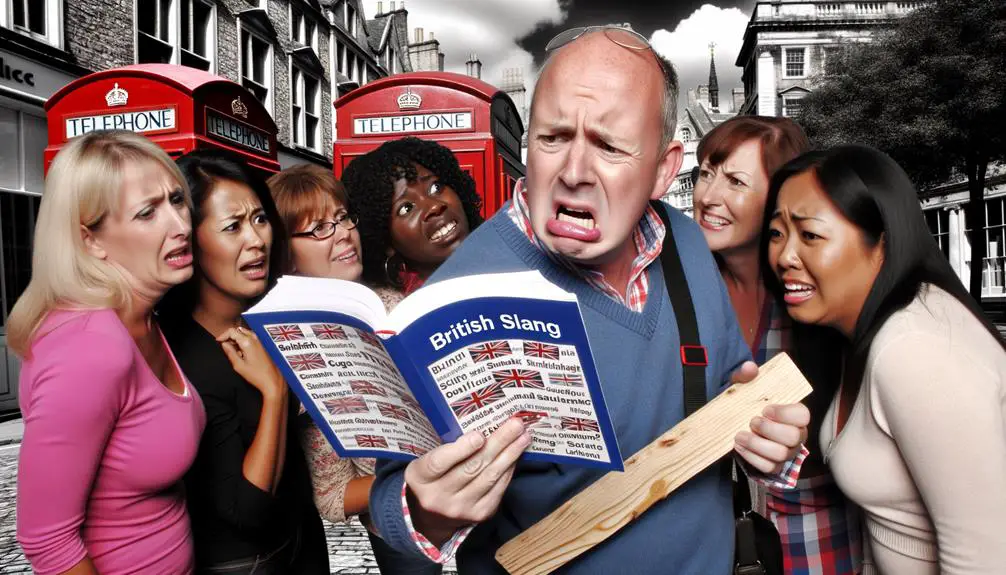
Several common misunderstandings about the slang term 'plank' stem from its varied interpretations and uses across the UK. You might find yourself perplexed by the term, particularly if you're unfamiliar with the regional dialects that shape its meaning. The phrase, which often denotes a lack of intelligence or common sense in someone, isn't uniformly employed or understood, leading to notable confusion and misinterpretation.
Language barriers play a major role in these misunderstandings. For someone not steeped in British vernacular, 'plank' might conjure images of wooden boards rather than being recognized as a playful insult. This confusion is compounded when individuals from different parts of the UK or English-speaking countries encounter the term, as the nuances of its use may vary significantly.
Moreover, cultural nuances further muddy the waters. What's considered a harmless jibe in one context may be seen as a more severe insult in another, depending on local sensibilities and the relationship between the individuals involved. This discrepancy often leads to miscommunication, as the intended light-heartedness or severity of the term is lost in translation.
Understanding 'plank' thus requires not only a grasp of the word itself but also an appreciation of the intricate web of cultural and linguistic factors that influence its reception. Without this understanding, you're likely to either misinterpret its usage or, worse, misuse it yourself, potentially offending others or creating awkward social situations.
Responses and Reactions

You'll observe that the public's interpretation of 'plank' in British slang varies widely, influenced by factors such as regional dialects and cultural context.
Social media has amplified these variances, creating a buzz that sometimes leads to misunderstandings.
These misunderstandings necessitate confirmations to guarantee accurate comprehension and use of the term.
Public Interpretation Variances
How does the public's understanding of the British slang term 'plank' vary across different contexts and communities?
The variance largely stems from cultural nuances and regional dialects, which play a pivotal role in shaping the term's interpretation. In some areas, 'plank' might be understood as a lighthearted jest, while in others, it could carry a more derogatory connotation. The disparity in perception underscores the complexity of linguistic evolution within the UK's diverse cultural landscape.
Additionally, the term's reception is influenced by factors such as age, social circles, and exposure to British media. As 'plank' traverses through different social strata and geographical boundaries, its meaning undergoes subtle shifts, reflecting the dynamic nature of language and its inherent sensitivity to cultural and regional idiosyncrasies.
Social Media Buzz
On social media platforms, the term 'plank' has sparked a diverse array of responses and reactions, reflecting its nuanced interpretation across different online communities. Analyzing the hashtag trends, one observes a fascinating phenomenon where the term oscillates between earnest inquiry and playful banter.
Influencer impact is palpable, with key social media figures either amplifying the term's traditional British connotation or reinventing it, thereby contributing to its viral spread. This dynamic interplay between traditional meanings and contemporary reinterpretations underscores the role of digital communities in evolving language.
Consequently, the term 'plank' has transcended its initial cultural confines, propelled by the mechanisms of social media engagement, and has become a focal point for discourse, generating a rich tapestry of online interaction.
Misunderstandings and Clarifications
Amid the vibrant discourse surrounding the term 'plank' on social media, a substantial amount of confusion has arisen, necessitating a deeper examination of its multifaceted interpretations and the need for precise clarifications. The cross-cultural implications and linguistic nuances of 'plank' have led to misunderstandings that highlight the importance of context in interpreting slang.
- Cultural Context: In some cultures, 'plank' might be seen as a playful insult, while in others, it could be considered harsh.
- Linguistic Variation: Dialects and regional expressions profoundly impact its perceived meaning.
- Social Media Amplification: Online platforms often strip away nuances, leading to misinterpretations.
- Need for Clarification: Misunderstandings underscore the importance of seeking clarity to grasp the true intent behind the word 'plank'.
Teaching 'Plank' to Non-Natives
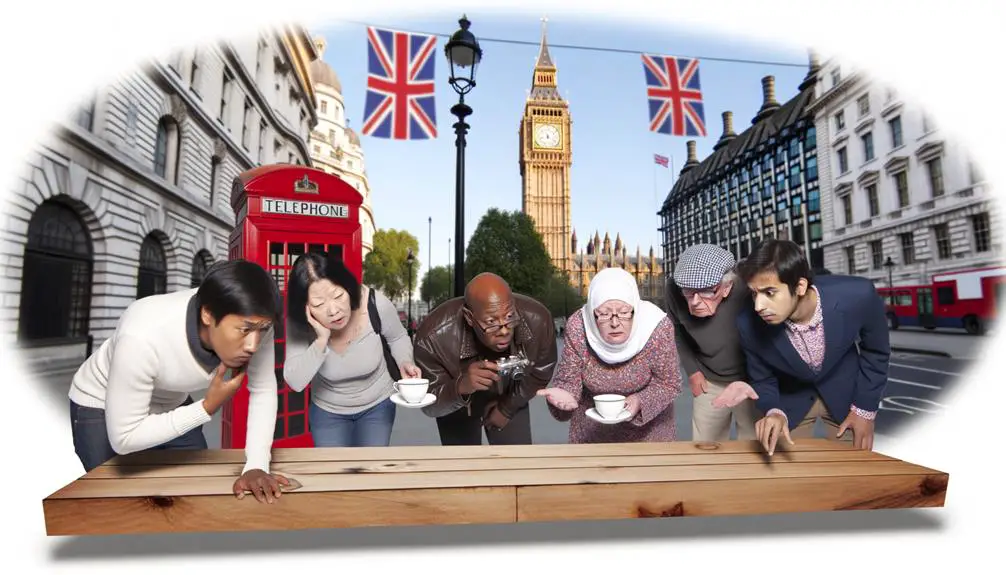
Understanding the British slang term 'plank' poses a unique challenge for non-native speakers, necessitating careful explanation of its nuances and context. This endeavor requires a high degree of cultural sensitivity, acknowledging that direct translations often fall short in conveying the term's full meaning and connotation. To navigate these language barriers effectively, one must first appreciate that 'plank' typically refers to someone perceived as foolish or lacking in intelligence, akin to calling someone a 'blockhead' in more universal English parlance.
When teaching 'plank' to non-native speakers, highlighting that its use is more nuanced than a mere insult is paramount. The term often carries a light-hearted, albeit mocking, tone, suggesting that the person it describes is endearingly clueless rather than maliciously incompetent. This distinction is critical, as it underscores the importance of context in understanding and using the term appropriately. Without this clarification, non-natives might misuse 'plank', potentially leading to misunderstandings or offense.
Moreover, discussing the informal nature of 'plank', emphasizing that it finds its place in casual conversation rather than formal discourse, is crucial. This demarcation aids learners in grasping the appropriate settings for its use, further reducing the likelihood of cultural faux pas.
In essence, teaching 'plank' to non-natives isn't merely an exercise in vocabulary expansion but an invitation to explore the subtleties of British cultural expression. Through meticulous explanation and contextualization, learners can navigate the complexities of slang, enriching their understanding of the language and culture.
Evolving Meanings and Usage
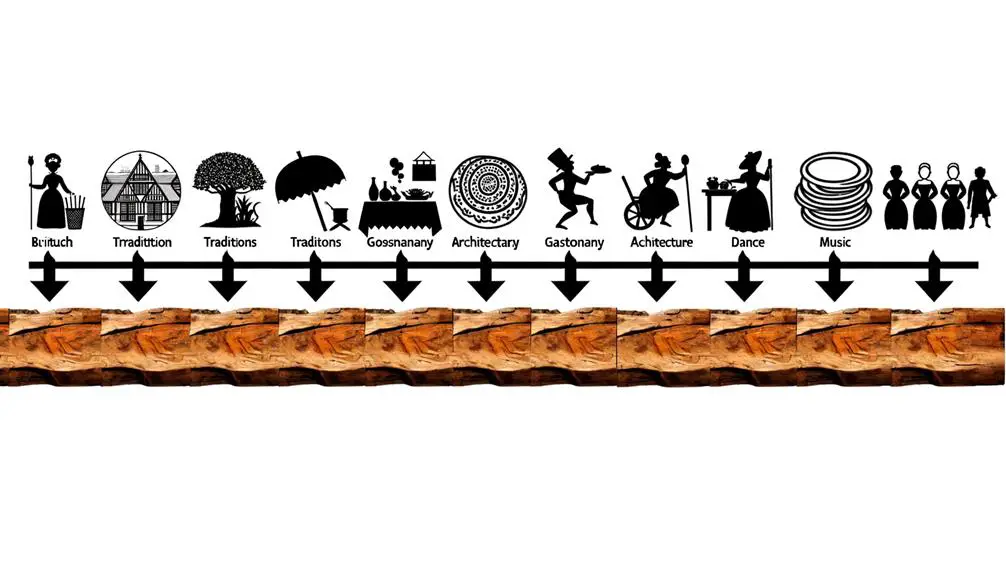
While teaching the term 'plank' to non-native speakers unveils the intricacies of British slang, it's also important to examine how its meanings and usages have shifted over time. Language evolution is a demonstration to the fluidity of communication, reflecting changes in societal attitudes and cultural significance. The term 'plank', once primarily a physical descriptor, has evolved in usage within various contexts, showcasing the dynamic nature of language.
- Originally: 'Plank' referred to a simple, flat piece of timber. This foundational meaning set the stage for subsequent metaphorical interpretations.
- Metaphorical Shift: Over time, 'plank' began to describe someone perceived as dull or lacking in intelligence, illustrating the language's capacity for creative evolution.
- Cultural Significance: The usage of 'plank' as slang highlights how language mirrors societal values and humor. It encapsulates a uniquely British penchant for affectionate ribbing.
- Contemporary Use: Today, 'plank' embodies both its original and evolved meanings, depending on context, underscoring the importance of understanding linguistic nuances.
This evolution of 'plank' from a straightforward term to a multifaceted piece of slang underscores the importance of context in language learning. It's a prime example of how expressions adapt to reflect current societal norms and cultural shifts. Understanding these changes is vital for non-native speakers attempting to grasp the subtleties of British slang. The journey of 'plank' from a literal object to a playful insult reveals much about the playful, evolving nature of language and its reflection of cultural identity.
Frequently Asked Questions
How Does the Term 'Plank' Compare With Similar Insults in Other Languages, and What Does This Reveal About Cultural Attitudes Towards Intelligence?
When you investigate how 'plank' compares with similar insults in other languages, you delve into cultural linguistics and intelligence metaphors. This exploration reveals deep cultural attitudes towards intelligence.
Every culture uses unique metaphors to express disdain for perceived lack of intelligence, reflecting underlying values and social norms. By analyzing these differences, you gain insights into how societies view intellect and the attributes they prioritize or disparage.
It's a fascinating study of language and perception.
Has the Use of 'Plank' in Digital Communication, Such as Social Media and Texting, Led to New Abbreviations or Emoji Representations?
Exploring the digital seas, you've likely come across the emoji evolution and slang globalization in your travels. The term 'plank,' once restricted to British lexicon, has found new life online. Through social media and texting, it's sparked unique abbreviations and emoji representations, reflecting how digital platforms can transform slang.
This phenomenon not only demonstrates the adaptability of language but also highlights the creative ways in which we express disdain or amusement across the digital landscape.
Are There Legal Implications or Cases Where the Term 'Plank' Has Been Central in Workplace Harassment or Discrimination Suits in the Uk?
Certainly, you're curious if 'plank,' with its etymology tied to British slang, has sparked legal disputes, particularly in workplace harassment or discrimination cases in the UK.
Delving into workplace diversity, it's crucial to grasp how language, including slang like 'plank,' can influence work environments.
While specific cases aren't widely publicized, it's advisable to ponder how such terms might impact inclusivity and respect among colleagues, potentially leading to legal challenges.
How Do Mental Health Professionals in the UK View the Use of 'Plank' in Everyday Language, Considering Its Implications on Self-Esteem and Social Interactions?
You're exploring how mental health professionals perceive the term 'plank' in the UK, particularly its impact on self-esteem and social interactions.
They scrutinize the etymology of 'plank' to understand its connotations and implications.
Through self-esteem workshops, they analyze its effects on individual's confidence and peer dynamics.
This scholarly approach underscores the importance of language in shaping mental health, highlighting the need for awareness in everyday communication to foster positive social environments.
In What Ways Have British Expatriate Communities Adapted or Abandoned the Term 'Plank' in Their Communication Within Non-English Speaking Societies?
You're exploring how British expats adapt their language in non-English speaking societies, focusing on 'plank.' It's about cultural integration and language evolution.
In their quest to fit in, expats often modify or drop certain slang to avoid misunderstandings. This adaptation showcases a keen awareness of cultural sensitivities and the dynamics of language use abroad.
It's a fascinating look at how expatriates navigate linguistic challenges while maintaining their identity.
Conclusion
As you've journeyed through the linguistic landscape of 'plank,' uncovering its origins, usage, and cultural significance across the UK, you're now poised at a precipice.
The term, rich in nuance and variation, stands as a proof to the dynamic nature of language. But beware, for as you integrate 'plank' into your lexicon, its evolving meanings await to challenge your understanding.
The quest to master 'plank' isn't a destination but a continuous exploration, inviting scholarly inquiry and analytical precision at every turn.







